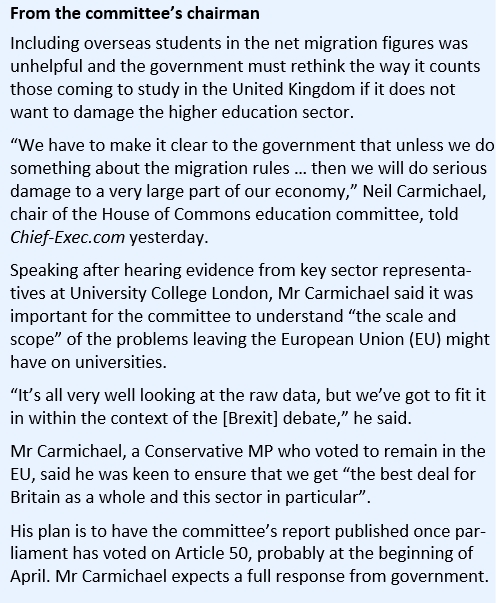It really is all about the numbers, whether it be funding for ground breaking – often life saving – research, undergraduate or postgraduate students or engaging with emerging markets.
The scale of the figures involved means Brexit has the capacity to seriously damage the nation’s multi-billion pound higher education sector.
That is what the House of Commons Education Committee was told yesterday when it took evidence in a packed Haldane room at University College London (UCL).
President and Provost at UCL, Michael Arthur, outlined the difficulties his university faced. Students from 160 countries were enrolled. Thirty per cent of UCL students were from outside the European Union, and 12 per cent from within the EU.
The university had successfully branded itself as London’s global university, he said.
“It doesn’t look so good if [our banner] says ‘UCL – London’s global university minus Europe’,” Professor Arthur quipped.
In the 2016-17 academic year 39,473 students enrolled at UCL – 4,926 were from the EU, predominantly from France, Italy, Germany, Greece and Spain. Those EU students now face an uncertain future, not knowing what visa changes lie ahead or if they will be eligible for the loans they need to complete their courses. Applications from EU students have already fallen by 7.43 per cent.
[EU students] were being used as pawns in a political game, where their right to continue to study appeared to be dependent on what Mrs May could get for UK nationals living in Europe
There are 12,300 staff at UCL, 7,900 of them are from the UK and 2,600 from the EU – mainly Italy, Germany and France. Of that 2,600 figure, 1,099 are researchers and 563 academics.
Those researchers and academics collaborate on projects and are heavily reliant on EU funding, especially from the European Research Council and Horizon 2020. Since 2007, UCL has been awarded 160 ERC grants. And, since 2014 when Horizon 2020 began, UCL has been awarded 46 grants.
Professor Arthur said that, since last June’s referendum, he had written to all relevant departments seeking clarification on future collaboration. “Basically I was told ‘don’t phone us, we’ll phone you’,” he told the committee.
The best researchers were those Europeans that came to the UK as post-doctoral students and then spent many years working on important scientific discoveries, he said. “They’re now very worried about the pernicious effect of Brexit … EU students are very talented. They come from a diversity of cultures. The creativity of a university is fuelled by that diversity of culture and talent.”
 Professor Arthur’s concerns were supported by the six other witnesses from across the sector that gave evidence. Sally Hunt, general secretary of the University and College Union told the committee that Brexit and anti-immigration rhetoric were damaging UK higher education. She recognised that Prime Minister Theresa May’s recent announcement of an industry green paper that could lead to new funding for research and development offered some reassurance.
Professor Arthur’s concerns were supported by the six other witnesses from across the sector that gave evidence. Sally Hunt, general secretary of the University and College Union told the committee that Brexit and anti-immigration rhetoric were damaging UK higher education. She recognised that Prime Minister Theresa May’s recent announcement of an industry green paper that could lead to new funding for research and development offered some reassurance.
“But the reality is the future is still unclear,” Ms Hunt said. “I say that with some sorrow. In reality it’s an aspiration rather than a guarantee.”
Universities were still unclear about future funding – especially whether or not the government would replace any lost funds from the EU in the long term. Citizens from the EU had already begun to look elsewhere for long-term employment. And which staff and students would be allowed to stay in the UK – a complex policy question that should be properly debated – appeared to be driven by the Home Office, not higher education institutions, she said.
Soraya Vieru, a vice-president at the National Union of Students, told the committee there were 125,000 students from the EU paying to study at UK universities. Yet they were being used as pawns in a political game, where their right to continue to study appeared to be dependent on what Mrs May could get for UK nationals living in Europe.
Asked by committee members what she believed should be a priority for government in the lead up to Brexit, Ms Vieru said: “a workable immigration system”.
This is not the time to take a step backwards if we’re looking to build a fairer Britain
Jo Beall, director of education and society at the British Council, said she welcomed the government’s aspirations for “a global Britain”, but for that to become a reality Britain needed “global graduates” and a hard Brexit threatened both. “We need to take students out of net migration figures,” she said.
“It’s vital that we engage with emerging markets. For example we’re working with 80,000 students from China, 25,000 from India,” Dr Beall said. “… International higher education is becoming increasingly regionalised. This is not the time to take a step backwards. … We can’t say ‘we want to trade with you, but we don’t want to see your children in our universities’.”
Nicola Dandridge, chief executive at Universities UK, said the government had “an unparalleled opportunity to recalibrate” the immigration system.
She too urged that students be removed from the net migration figure, saying “we welcome genuine students [but] immigration policy must be based on robust data”. The International Passenger Survey was unreliable and governments needed to stop making changes to immigration rules so that the system could be relied upon by those hoping to study in the UK.
Gavan Conlon, partner and head of education and labour markets at London Economics, said the UK had become “slightly tainted” in the months following the referendum and it needed to act quickly to change that perception. Universities might benefit from the falling pound, which had dropped 10.6 per cent since the referendum, but the uncertainty that also followed changes everything.
Rosie Burchard, director of external relations at the Erasmus Student Network UK, said: “This is not the time to take a step backwards if we’re looking to build a fairer Britain”.
By Aban Contractor




